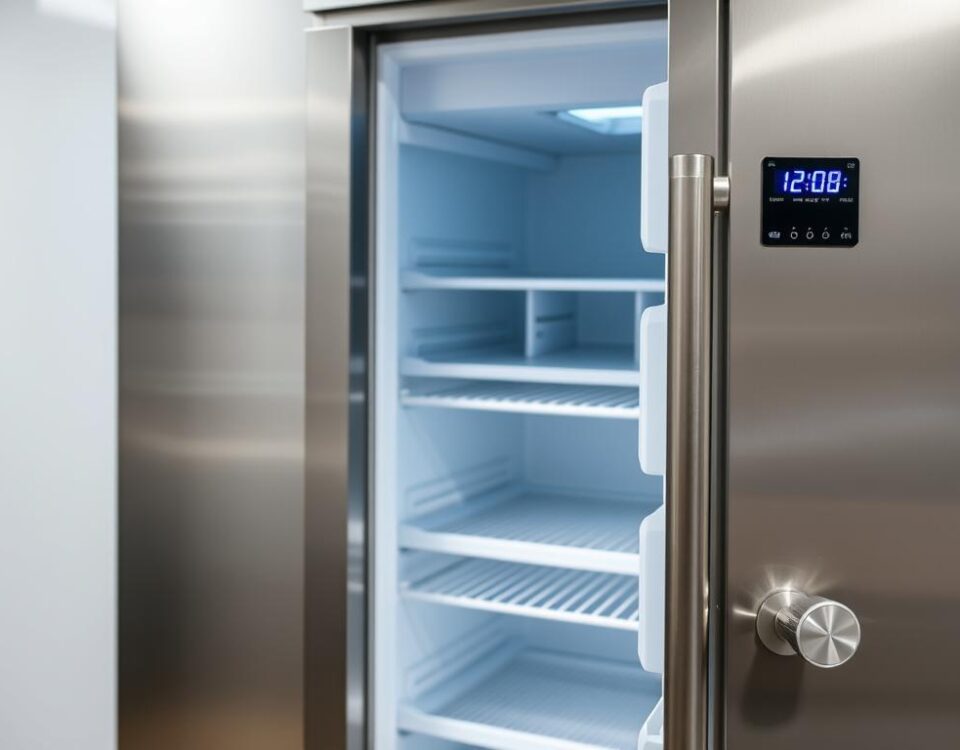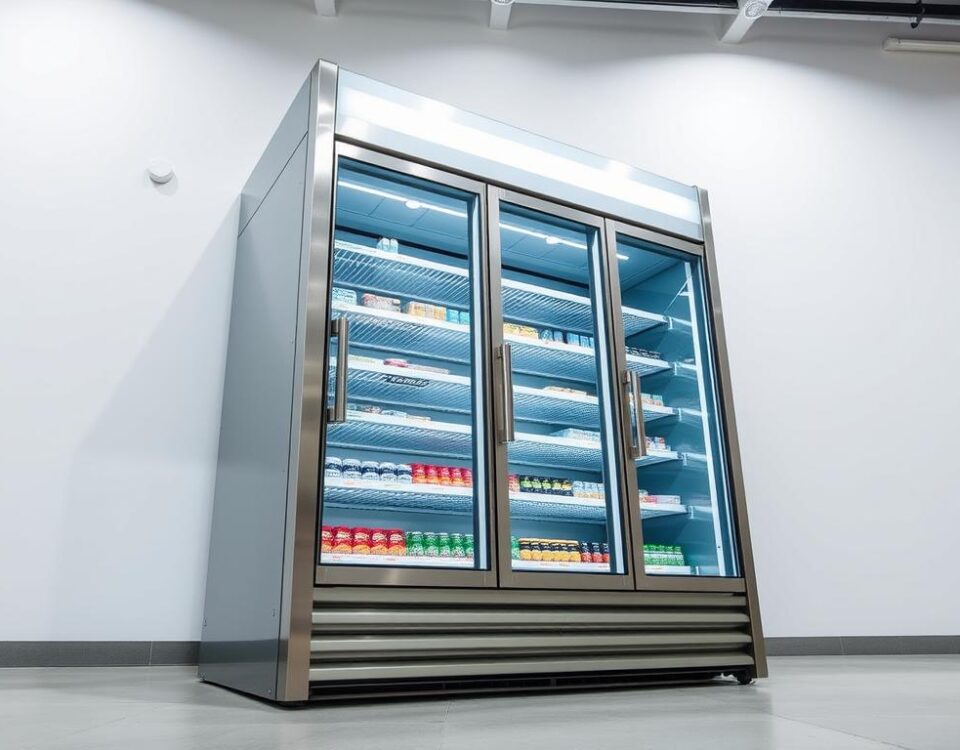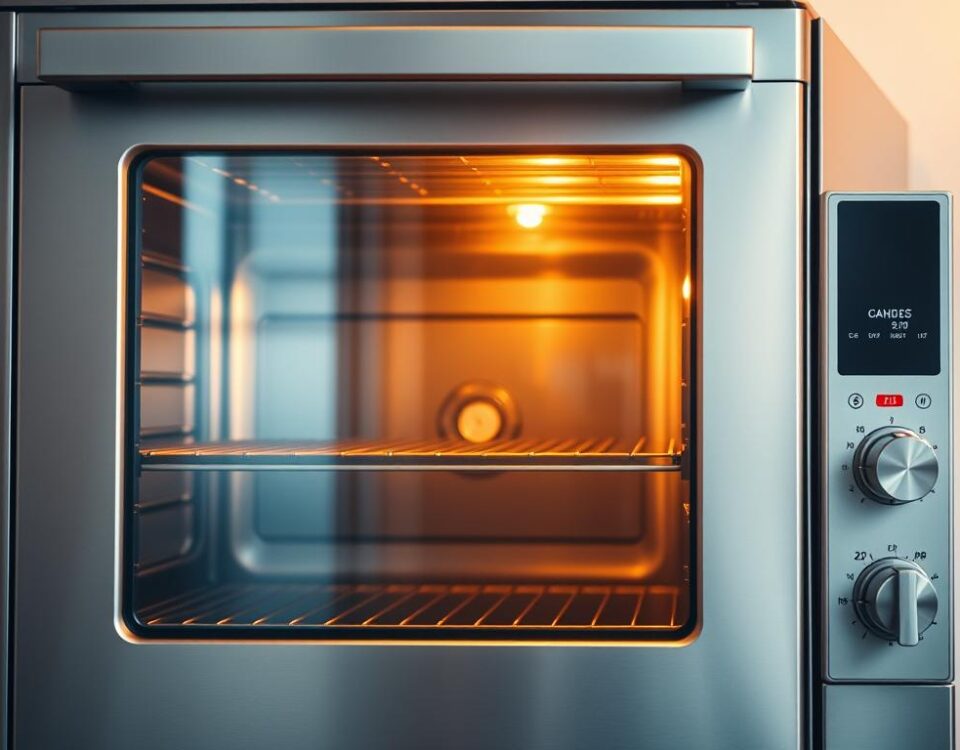
Gas vs Electric Fryer Operating Cost: Real Numbers Revealed
September 13, 2025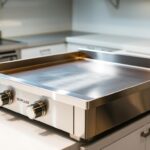
Griddle vs Charbroiler: Which Costs More Long-Term?
September 14, 2025As a restaurant owner, I’ve learned that the right cooking equipment can make or break your business. A commercial fryer is a crucial appliance for any food service establishment that serves fried foods. Did you know that a poorly chosen fryer can lead to inconsistent food quality, wasted oil, and decreased kitchen efficiency?
With so many fryer brands available, it can be overwhelming to decide which one is best for your business. In this article, I’ll explore the key differences between top commercial fryer brands, helping you make an informed decision that impacts your food quality and bottom line.
Key Takeaways
- Understand the critical differences between leading fryer brands
- Learn how the right commercial fryer choice impacts food quality and operational efficiency
- Compare heating technologies, fuel efficiency, and advanced features across top brands
- Discover how brands like Frymaster, Pitco, and Henny Penny differ in their approaches to commercial frying
- Determine which commercial fryer brand best aligns with your specific business needs
Understanding Commercial Fryers and Their Importance
Commercial fryers are not just a necessary appliance; they are a key to delivering high-quality fried foods consistently. In the competitive world of restaurants and food service, the right fryer can be a game-changer.
What Is a Commercial Fryer?
A commercial fryer is a kitchen appliance designed for heavy-duty frying in restaurants, cafes, and other food service establishments. Unlike domestic fryers, commercial fryers are built to withstand continuous use and high volumes of food. They come in various sizes and types, including gas and electric models, to suit different business needs.
Why the Right Commercial Fryer Matters for Your Business
The right commercial fryer can significantly impact your business’s efficiency, food quality, and customer satisfaction. A suitable fryer ensures consistent cooking results, reduces cooking time, and can help in managing kitchen workflow. Moreover, modern commercial fryers come with advanced features such as programmable controls and oil filtration systems, which can enhance operational efficiency and reduce costs.
Overview of Top Commercial Fryer Brands
The market for commercial fryers is dominated by several top brands known for their quality, innovation, and customer service. Brands like Frymaster, Pitco, Vulcan, Imperial, and Henny Penny offer a range of models with unique features. For instance, Frymaster is renowned for its high-quality equipment with built-in filtration systems, while Pitco fryers are known for their efficiency and versatility. Understanding the strengths of each brand is crucial for making an informed decision that meets your business needs.
Heating Technology: How Top Brands Differ
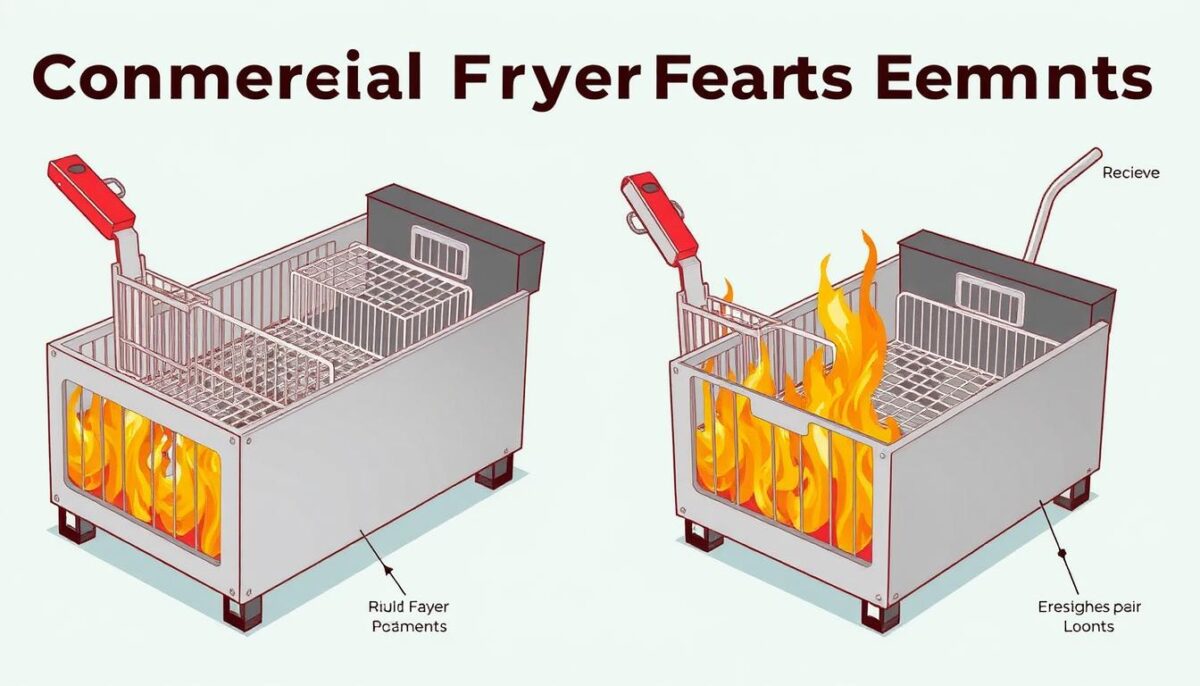
The heart of any commercial fryer lies in its heating technology, a critical factor that differentiates top brands. Heating technology directly impacts the fryer’s performance, efficiency, and the quality of the food it produces.
Tube and Baffle Systems
Tube and baffle systems are a common heating technology used in commercial fryers. These systems involve tubes that heat the oil, with baffles directing the flow of oil around the tubes for even heating. This design helps in achieving uniform temperature distribution.
Open Pot Designs
Open pot designs feature heating elements directly immersed in the oil. This straightforward approach can offer simplicity in maintenance and potentially faster recovery times. However, it may also lead to hotspots if not designed properly.
Flat-Bottom Technology
Flat-bottom technology involves heating elements located at the bottom of the fryer. This design can provide efficient heat transfer and is often associated with electric fryers. Flat-bottom fryers are known for their ease of cleaning and can be more energy-efficient.
Ribbon Element Systems
Ribbon element systems utilize coiled electric heating elements directly immersed in the fryer oil, similar to those found on traditional electric stovetops. These systems are exclusively found in electric fryers and offer precise temperature control. The direct immersion of heating elements into the oil ensures efficient energy transfer, making them relatively energy-efficient. However, they might have slower recovery times compared to gas-powered systems.
Top brands have innovated on basic ribbon element designs to improve performance and durability. For instance, some have enhanced the materials used for the ribbon elements to prolong their lifespan and improve heat transfer efficiency.
Fuel Type and Energy Efficiency Comparison

The choice between gas-powered and electric commercial fryers can significantly impact your kitchen’s efficiency and operational costs. As a business owner, understanding the differences between these two fuel types is crucial for making an informed decision.
Gas-Powered Commercial Fryers
Gas-powered commercial fryers are known for their ability to quickly reach high temperatures, which is essential for busy kitchens. They can be more cost-effective, especially in areas where gas is cheaper than electricity. However, their energy efficiency varies across different models and brands.
Electric Commercial Fryers
Electric commercial fryers, on the other hand, are recognized for their energy efficiency, potentially saving money in the long run. They are often preferred in kitchens where electricity is the primary energy source or where precise temperature control is necessary.
Energy Efficiency Ratings Across Brands
When comparing commercial fryer brands, ENERGY STAR ratings and efficiency metrics are crucial indicators of a model’s energy efficiency. Different brands approach insulation and heat retention differently, impacting energy waste during operation. Recovery efficiency also varies, affecting both energy consumption and cooking performance.
By analyzing these factors, businesses can make informed decisions that balance their operational needs with energy efficiency and cost savings.
Oil Capacity and Size Options
The size and oil capacity of a commercial fryer are key factors in determining its suitability for your business. Different kitchens have different needs, and understanding these options is crucial for making an informed decision.
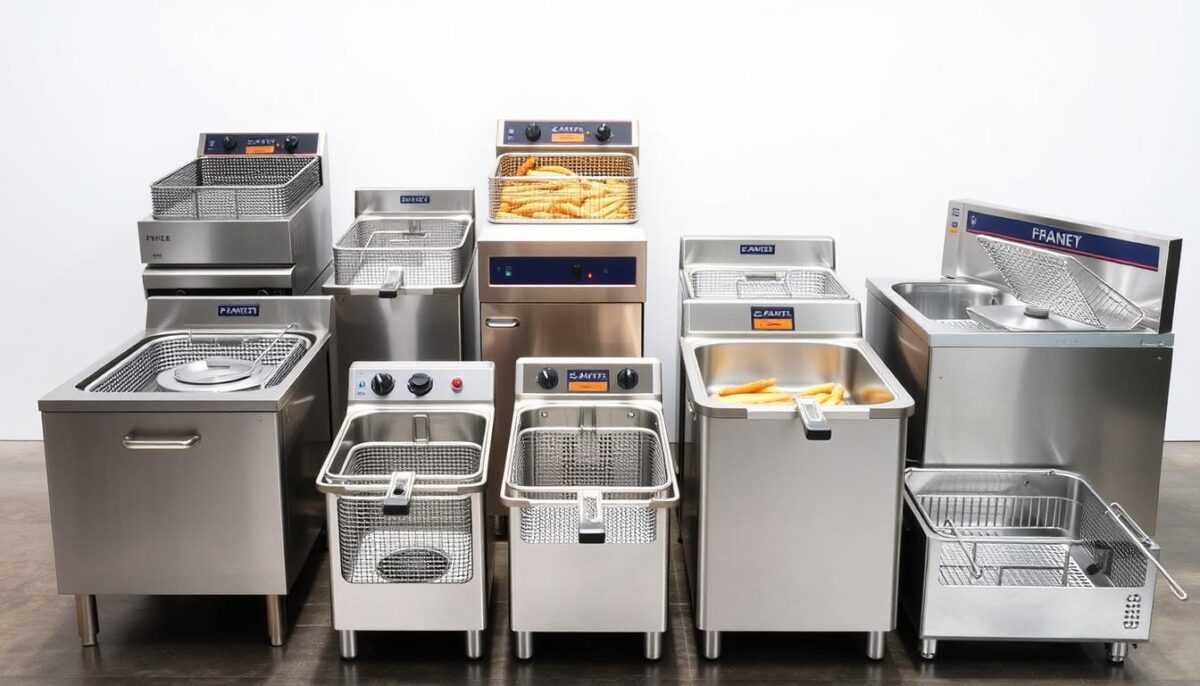
Countertop Models Comparison
Countertop commercial fryers are ideal for smaller kitchens or establishments with limited space. They come in various sizes, typically ranging from 10 to 40 pounds of oil capacity. Brands like Frymaster and Pitco offer high-quality countertop models that are compact yet efficient.
Floor Model Differences
Floor models, on the other hand, offer larger oil capacities, often between 35 to 100 pounds or more. These are suitable for high-volume kitchens. The size and capacity of floor models vary significantly across brands, with Vulcan and Imperial offering robust options.
Specialty Size Options by Brand
Specialty fryers are designed for specific cooking tasks, such as frying donuts or corn dogs. Brands like Henny Penny offer unique specialty fryer sizes and configurations. For instance, funnel cake fryers are wide and shallow, while corn dog fryers have inserts to hold the handle above the oil.
I will examine the diverse range of specialty size options offered by major brands, including their unique configurations for particular applications. Certain brands have developed modular systems that can be customized to specific kitchen needs, enhancing their versatility.
Temperature Control and Recovery Time
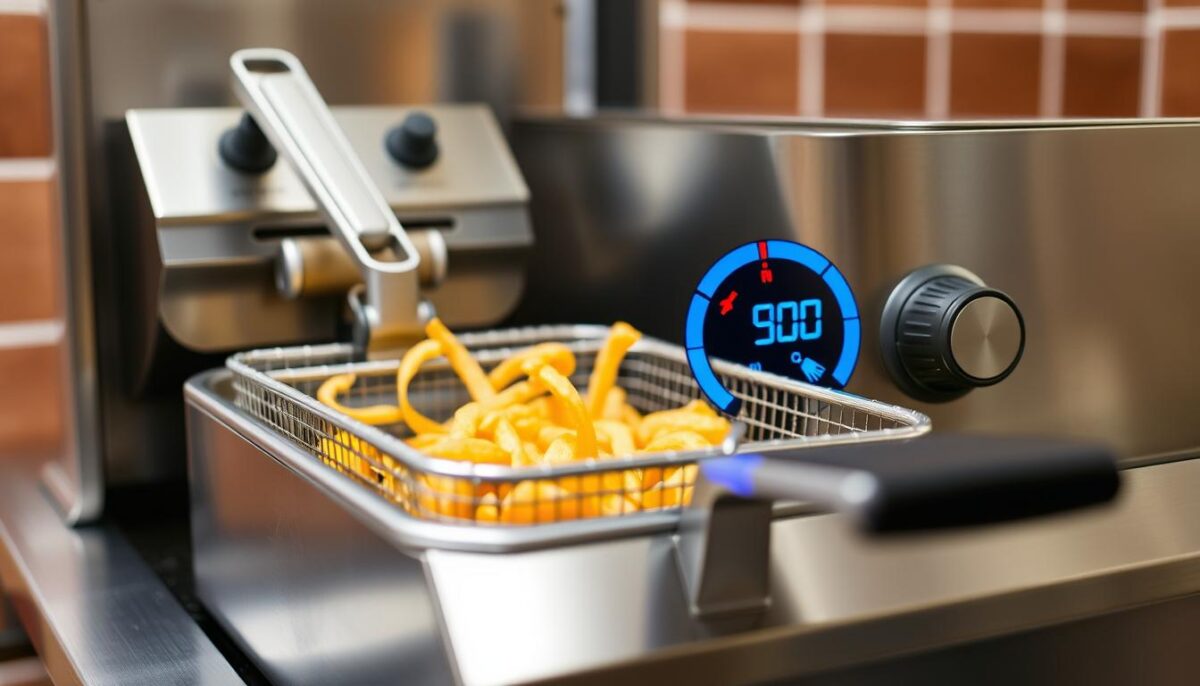
Achieving perfect fried foods hinges on two critical factors: temperature control and recovery time. Maintaining the right temperature is not just about cooking the food; it also affects how long the oil lasts and the overall texture and taste of the food.
Precision Temperature Control Features
Top commercial fryer brands offer advanced temperature control features that allow for precise adjustments, ensuring that the oil is always at the optimal temperature for cooking. This precision is crucial for achieving consistent results and improving the overall quality of the fried food.
Recovery Time Differences Between Brands
The recovery time of a commercial fryer, or how quickly it can return to the set temperature after food is added, varies significantly between brands. Brands that offer faster recovery times can maintain a consistent cooking environment, which is essential for producing high-quality fried foods with great consistency.
Impact on Food Quality and Consistency
The ability of a commercial fryer to maintain precise temperature control and achieve quick recovery times directly impacts the quality and consistency of the fried foods. By minimizing temperature fluctuations, these fryers help ensure that every batch of food is cooked to perfection, enhancing the overall dining experience.
Durability and Build Quality Among Commercial Fryer Brands

When investing in a commercial fryer, durability is a key factor to consider. The longevity of your equipment can significantly impact your business’s bottom line and operational efficiency.
Construction Materials Comparison
The construction materials used by different brands can greatly affect the quality and durability of their commercial fryers. For instance, stainless steel is often preferred for its resistance to corrosion and ease of cleaning. I’ll compare the materials used by top manufacturers, such as Frymaster and Pitco, to determine which ones offer the most robust construction.
Expected Lifespan by Brand
The expected lifespan of a commercial fryer varies significantly between brands, depending on factors like usage, maintenance, and build quality. I’ll analyze customer feedback and reviews to estimate the average lifespan of fryers from major brands, providing insight into which ones are likely to last longer and require less maintenance.
Warranty Offerings
A comprehensive warranty can provide peace of mind and protect your investment. I’ll examine the warranty terms offered by different brands, including the length of coverage, parts and labor included, and the quality of service. This will help you understand which brands stand behind their products with the strongest warranty protection and most responsive service.
Advanced Features and Technology
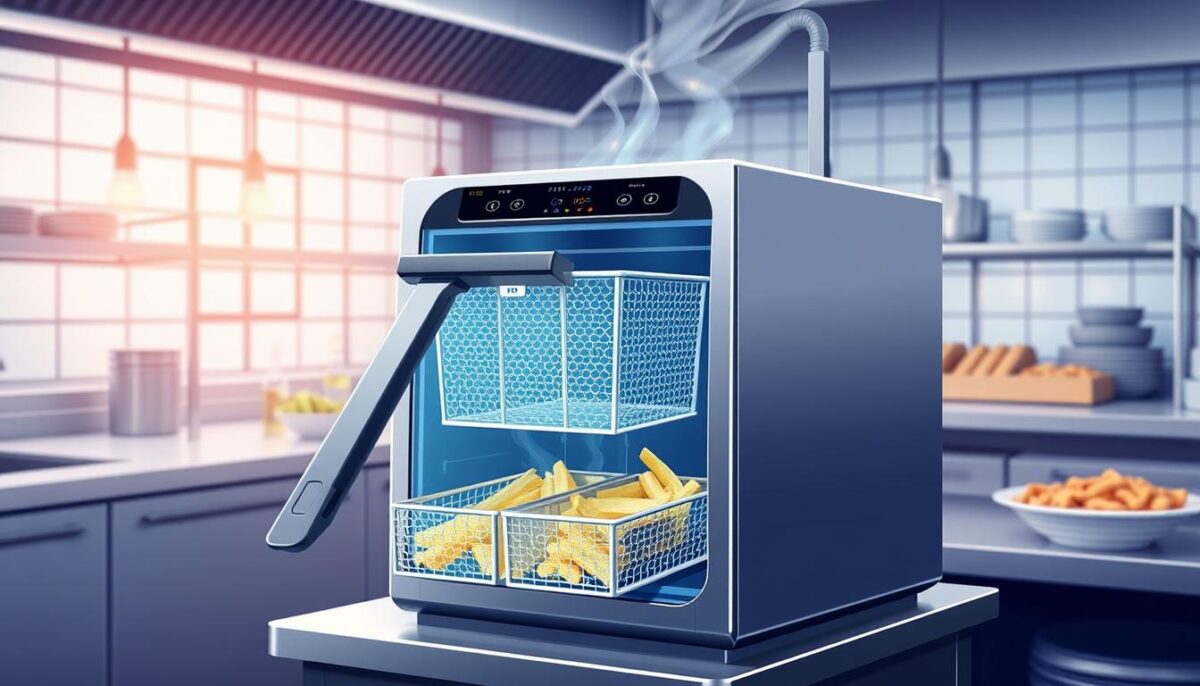
Advanced features in commercial fryers are revolutionizing the way kitchens operate, making them safer and more efficient. One of the critical advancements is in oil filtration systems, which play a significant role in maintaining oil quality and reducing waste.
Oil Filtration Systems
Oil filtration systems are a crucial feature in modern commercial fryers, enabling kitchens to maintain oil quality, reduce waste, and save on costs. Brands like Frymaster and Pitco offer advanced filtration systems that can filter oil in minutes, minimizing downtime and maximizing frying time. These systems not only improve the taste and quality of fried foods but also contribute to a safer kitchen environment by reducing the risk of oil spills and burns.
Programmable Controls and Automation
Programmable controls and automation are another significant advancement in commercial fryer technology. These features allow for precise temperature control, automated frying times, and even automated cleaning cycles. Brands such as Henny Penny and Vulcan offer fryers with sophisticated programmable controls that can be tailored to specific frying tasks, enhancing consistency and reducing operator error. This level of automation not only improves kitchen efficiency but also helps in maintaining a consistent product quality.
Safety Features Comparison
Safety is a paramount concern in commercial kitchens, and modern fryers are equipped with various safety features to protect operators. Features such as automatic shut-off, high-temperature limit switches, and cool-touch exteriors are designed to prevent accidents. A comparison of safety features across brands reveals that some, like Imperial, prioritize operator safety with comprehensive protection systems, including advanced thermal cutoff and oil level monitoring. Ensuring that your commercial fryer is equipped with robust safety features is crucial for preventing kitchen accidents.
In conclusion, the advanced features and technologies in modern commercial fryers significantly enhance kitchen operations, from improving food quality through oil filtration systems to ensuring operator safety with sophisticated safety features. When selecting a commercial fryer, it’s essential to consider these features to optimize your kitchen’s efficiency and safety.
Top Commercial Fryer Brand Profiles
Let’s dive into the profiles of leading commercial fryer manufacturers, exploring their unique strengths and contributions to the industry.
Frymaster: Strengths and Specialties
Frymaster is renowned for its high-performance commercial fryers, designed to meet the demands of busy kitchens. Their products feature advanced oil management systems, ensuring consistent food quality and reduced oil waste. Frymaster’s fryers are also known for their durability and ease of maintenance, making them a popular choice among restaurant owners.
Pitco: Key Differentiators
Pitco stands out in the commercial fryer market with its innovative designs and commitment to energy efficiency. Their fryers are engineered to provide rapid recovery times, allowing for continuous frying without compromising on food quality. Pitco’s focus on sustainability is evident in their eco-friendly fryer models.
Vulcan: Standout Features
Vulcan offers a range of commercial fryers that are built to last, with robust construction and reliable performance. Their products often feature advanced temperature control systems, enabling precise cooking and consistency across a variety of fried foods.

Imperial: Notable Advantages
Imperial’s commercial fryers are designed with versatility in mind, catering to different kitchen sizes and frying needs. Their products are known for their ease of use and comprehensive warranty offerings, providing peace of mind for business owners.
Henny Penny: Unique Offerings
Henny Penny is a leading manufacturer of commercial fryers, distinguished by their innovative features such as built-in filtration systems and automatic oil top-off. Henny Penny’s focus on pressure frying technology and automation makes their fryers ideal for high-volume operations, enhancing efficiency and food quality.
Henny Penny’s specialization in pressure frying technology sets them apart, offering unique cooking capabilities that benefit specific food service operations. Their commitment to energy efficiency and ease of use further solidifies their position in the market.
Conclusion: Choosing the Right Commercial Fryer Brand for Your Needs
After exploring the key differences between top commercial fryer brands, it’s time to make an informed decision for your business. To choose the right commercial fryer, consider your menu, volume, space constraints, and budget. The key differences we’ve discussed, including heating technology, fuel type, oil capacity, temperature control, durability, and advanced features, will help you narrow down your options.
When making your final decision, consider the total cost of ownership, not just the initial purchase price. Consulting with equipment specialists can provide personalized recommendations based on your kitchen’s specific needs. By investing in a quality fryer from a reputable brand, you’ll enhance food quality, operational efficiency, and equipment longevity, ultimately contributing to your business success.
FAQ
What are the key factors to consider when choosing a deep fryer for my restaurant or food truck?
When selecting a deep fryer, consider factors such as heating technology, fuel type, oil capacity, and temperature control to ensure it meets your business needs. I also recommend thinking about the type of food you’ll be frying and the available space in your kitchen.
How do I maintain my commercial deep fryer to prolong its lifespan?
Regular maintenance is crucial to extend the life of your deep fryer. I suggest filtering the oil regularly, cleaning the fryer after each use, and checking the heating elements for wear and tear. Additionally, scheduling annual professional maintenance can help prevent issues.
What are the benefits of using a gas-powered deep fryer over an electric one?
Gas-powered deep fryers offer faster recovery times and more precise temperature control, making them ideal for high-volume frying. They also tend to be more energy-efficient than electric models, which can help reduce your energy costs.
Can I use a countertop deep fryer for large quantities of food?
Countertop deep fryers are designed for smaller kitchens or lower-volume frying. If you need to fry large quantities, I recommend considering a floor model or a larger capacity fryer to meet your needs.
How do I ensure the quality and consistency of my fried foods?
To achieve consistent results, it’s essential to monitor the oil temperature and use the right type of oil for the food you’re frying. I also suggest investing in a deep fryer with precision temperature control and advanced filtration systems to maintain oil quality.
What safety features should I look for when purchasing a deep fryer?
When buying a deep fryer, look for safety features such as automatic shut-off, thermal cut-off, and secure lid or basket to prevent accidents. I also recommend considering a fryer with programmable controls to minimize the risk of human error.

